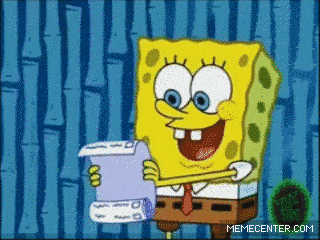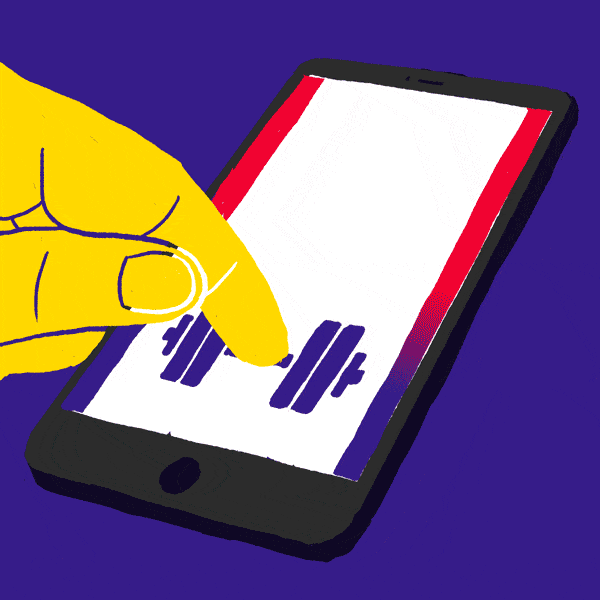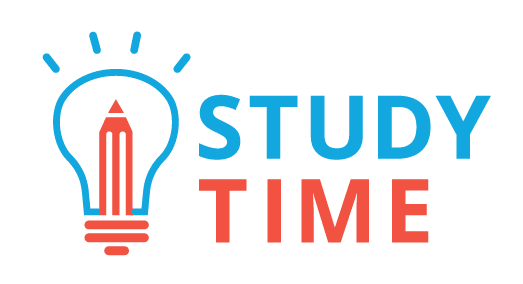When I was in high school, I knew exactly how much I was supposed to study, but I often spent a bunch of time procrastinating and then cramming at the last minute.
Now that I’m nearing the end of university, I’ve pretty much learnt all the tricks in the book to motivate study — even when I’d much rather pop my head in a sandwich press.

So if you’re at the point of the year where if you start studying now you’ll be ultra-prepared for exams — yet you spend ages scrolling through social media feeds on rotation — this is the article for you.
I’m gonna share the nine things I use to bust through my studies even when my motivation is nowhere to be found.
1. To Do List
It’s easy to get fooled into thinking you’re being productive by creating to-do lists, in depth study plans, motivational quotes, study-space cleaning rosters, highlighter-colour-code key terms sheets and so on.

Yeah, think about how much study you actually could have done in that time.
I used create super complex to-do lists and complex study plans. Now, within reason, I focus on the near future.
Here are the reasons:
a) If you focus on the here and now, you’re less likely to get overwhelmed by everything you have to do.
b) Brains are really bad at estimating how long things will take so it’s good to get the most urgent stuff out of the way with ASAP.
If you’re overwhelmed and unsure where to start with a mountain of study, ask yourself one thing: What are the next three things I will need to deliver?
List these down, and depending how urgent each task is, allocate your time accordingly.
If the things are equally as important and due or happen around the same date I aim to do an hour on each task and cycle through them.
When I complete a job I replace it with the next thing that will need delivering.
If you’ve got THAT ONE URGENT THING you’ve been putting off: don’t trick yourself into thinking it’s useful to write a study planner for the next five weeks.
Do it now you fool! You’ll feel a big sense of relief.
2. Minimise distractions
Ever had your computer slow right down from too many tasks? Just like a computer, your brain only has a limited ability to do multiple tasks at once.
We might think we’re good at multitasking, but in actual fact brains can only complete one task at a time. When it feels like you’re multitasking, you’re actually just switching quickly between different types of thinking fast.

Your brain gets a little more exhausted every time you go from shovelling meme after meme, to answering 50 messages, to trying to remember the finer details of Ms. Reeds’ poor explanation of mitosis and meiosis. Every new task creates some lag as the brain adjusts to what you’re asking it to do.
Scientists estimate it takes about 15 minutes to switch fully to a new task. That means that each notification you check, each message you respond to, your concentration will reduce for 15 minutes afterwards.

As much as it sucks, it’s for this reason I try to stick to choosing one task and focusing on it for a specified chunk of time.
I remind myself that I’ll actually enjoy my time on social media/ messing around doing other stuff more if I do it at a time I won’t feel guilty about it.
All this is easier said than done. How do we actually stop ourselves getting distracted?
3. Pomodoro Technique
In the modern world, it can feel like our brains are getting pulled in forty different directions at once.

You’d be forgiven for getting overwhelmed by trying to juggle internals, exams coming up, thinking about what to do with your life, and about that thing someone said to you earlier etc. etc. I often feel like my brain needs a dial so I can turn it down.
Enter: the Pomodoro Technique. If you haven’t heard of the Pomodoro Technique, it’s choosing one task and focusing on it for 25 minute intervals, taking a 5 minute rinse break and repeating. It’s deceptively simple.
I like to use the app forest to time my Pomodoros so I don’t get distracted by my phone. It also helps to turn your phone onto airplane mode so notifications can’t distract you. You can also use the Chrome version of forest which lets you block Facebook, Instagram and any other websites that often distract you. There are many other apps and chrome extensions that are similar.
The reason the Pomodoro Technique works for me is that it focuses on doing just one thing. No I’ll just check this or I’ll take a moment to get a snack. Whatever it is that distracts me, I tell myself to focus just a little longer and think about that later. Or you can get a distraction sheet…
4. The Distraction Sheet
The distraction sheet has helped me no end. If you’ve got a brain that loves to flit from thing to thing, it’ll help you too. I might be sitting down to do a serious bout of study, with a test just around the corner, but my brain still won’t stop interrupting me every minute with something irrelevant to say.

When I study, I make sure I know exactly what task I’ll be doing and for how long. I have a sheet of paper beside me to write anything that distracts me down on. When I put on the timer to do a Pomodoro, I make sure I have the sheet ready beside me.
As I try to study, I write down in a couple of words anything that distracts me. These might range from things I need to do to the cat I saw walking to class earlier. Instead of doing tasks immediately or daydreaming, I write these thoughts down.
Then, when I’m done, I can attend to the things that distracted me. Your brain is pretty good at drifting off — that’s totally normal — it’s making sure you’re on top of everything. However, I try to notice when I’m getting distracted and calmly bring my attention back to my intention for the study session.
5. Activation Energy
If you’ve ever done any chemistry, you might know about activation energy. That’s the bump of energy that a chemical reaction needs to start.
Without enough energy to get the chemicals excited they can’t do this:

Often, I feel like my brain needs some activation energy to get it moving. When I’d rather scrape chewing gum off the bottoms of the desks than study, that’s when I know I need activation energy.
The sad thing I’ve discovered is this: Activation energy is not waiting to be in the right mood or for inspiration to strike. Activation energy happens when you do that first painful Pomodoro and push through even though every minute is torture.

I ride the wave of discomfort, reminding myself I only have to focus for as long as the Pomodoro lasts. Often, I find that by the end of the first 25 minutes, I’ve normally become absorbed in the task. The activation energy is needed to get me over my idea of how boring or hard the task will be and once I’m doing it I find it’s not the worst thing in the world after all.
6. First Things First
Are you a chronic procrastinator who has trouble getting started even when you know you’ve got things you need to do? Maybe the first thing you do in the morning or after you get home from school is to reach for your phone and your ‘ten minutes checking notifications’ turns into a ten hour scroll-fest. As we explained above, you’re hitting that dopamine high and struggling to drag yourself away to study, which doesn’t release the same pleasure chemicals. Well, we’ve got a challenge for you.

Turn off the internet on your phone and computer before you go to bed (if you’re studying in the morning) or after you get home from school. Don’t use it until you’ve done an hour of study (or however long would be a challenge for you).
If you find that you end up turning the internet on without thinking, you can lock it off for a particular length of time by using the app Freedom.
Then reward yourself with some time on social media, or whatever sparks your dopamine.
I use this tip first thing in the morning, which might be helpful if you have the day off school. By doing some study first thing in the morning, you won’t have to tear yourself from whatever your ‘cake’ is. You’ll get your activation energy first thing in the morning, reminding yourself study isn’t too hard, making it easier to go back to later on. And on top of all that, you’ll got a portion of the study you need to do over and done with first thing.
7. Start with the hardest thing first
You know how we just said to start early in the day and just crush out that first hour of study? I always find that the study that needs the greatest activation energy is that one thing that you really don’t want to try and do. I like to force myself to get it over and done with first thing in my study session, so I don’t have to worry about it any more. I do it before I hit the internet for the day, as described above. That way I can reward myself after I get it done.

8. Search for the Ah-Hah Moment
You know that feeling where you hit a total wall with your study and you just want to go on YouTube and watch some cute animals or funny vids or ANYTHING that’s not spending another five minutes doing this one problem or writing this thing down?
When I’m feeling that sort of discomfort I remind myself that being in the zone comes in goes in waves. I ride the wave and push through for another Pomodoro and see if inspiration strikes if I stick with it a little longer.

If it’s an essay or long written form, make sure you’re kicking your perfectionist habits in the butt. Don’t try to be clever or interesting, just get the barest bones of what you want to say down on the page.
You can even bullet point it if you want. It doesn’t even have to make complete sense. This’ll help your brain work out what you’re trying to say as you go. Later, you can go back and clarify further.
If it’s a maths problem or a science problem that you don’t understand, first make sure you are utilising all your resource:
- Have you found similar problems in the textbooks, searched online and seen if there are tutorials on youtube.
- Have you taken a look at the walk-through study guide?
If you’ve been studying for a long while and are feeling exhausted, consider leaving it as your hard thing to work on first thing in the morning.
And don’t forget you could always ask a classmate or teacher for help.
9. Celebrate Successes
Gratitude journaling is a scientifically-proven practice that improves people’s happiness. It involves taking time each day to think carefully about what they’re grateful for in their lives and writing it down.
This helps increase the awareness of the positives rather than focusing on negatives as our brains are prone to do because of the negativity bias.
I like to take this concept and apply it to study, reflecting on things that I’ve done well during a study session. If you’re not keen on writing it down, you can just mull it over post-study.
Often I celebrate pushing through things I was finding difficult. I find when I’m unmotivated that’s the most important time to remind myself what I’ve done well. It helps me appreciate something in even the bleakest of study sessions.
For example: I’m really glad that I kept pushing myself to understand that algebra problem. I wanted to give up, but I studied worked-through examples on YouTube until I could do the problem myself.

The more I learnt what worked for me when I was unmotivated, the more I realised my brain is easily distracted by the ‘cake’ of internet content and likes to only do one simple task at a time.
Brains are simple creatures who’ve been the way they are before study and the information age. It’s no wonder they sometimes struggle with the tasks the modern world requires of them.
Effective study, in my opinion, is about breaking down the waterfall of information we are consuming both in class and out of it. It’s about understanding how content that we procrastinate with can derail our study with a dopamine rush, and how to avoid this. It’s also about breaking down the work we have to do into chunks, so that we can feel rewarded by small achievements, rather than overwhelmed by daunting exams.


0 Comments